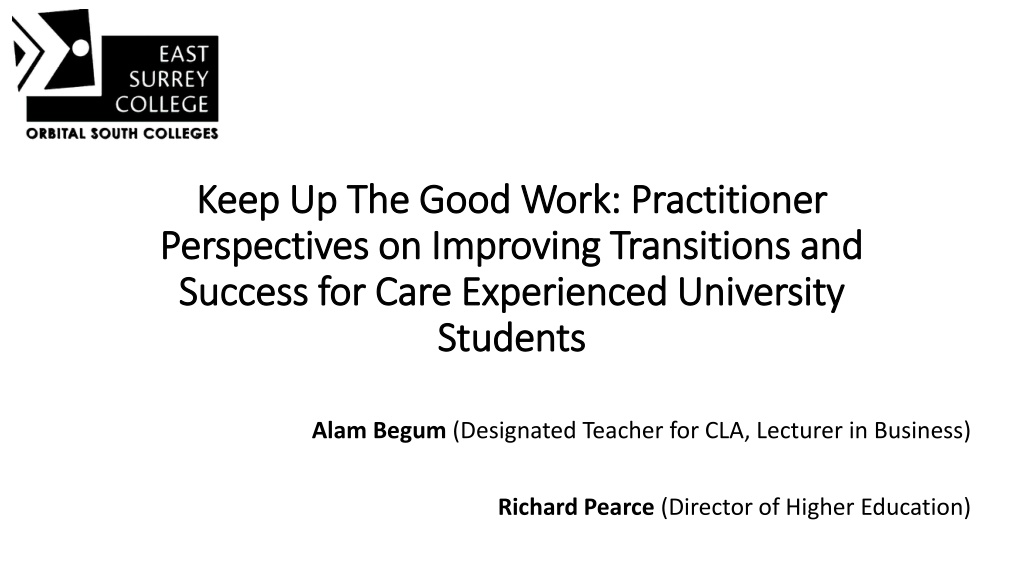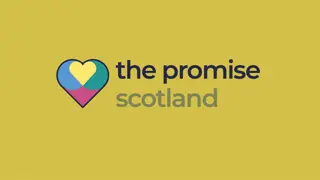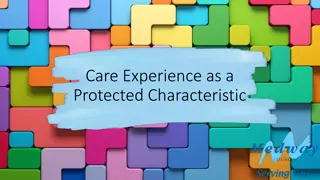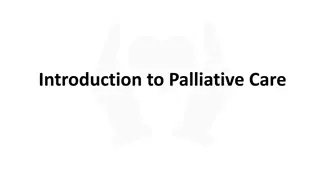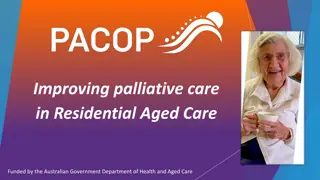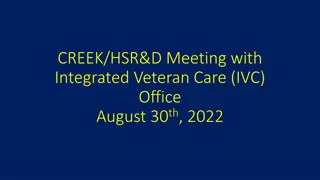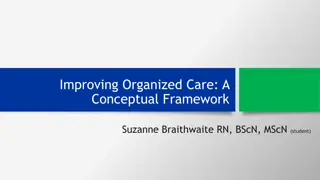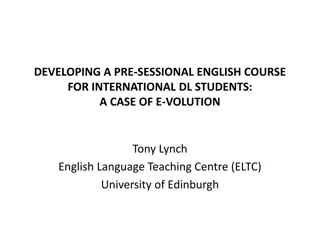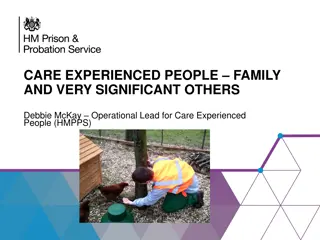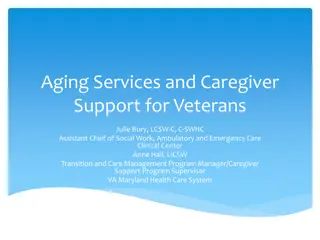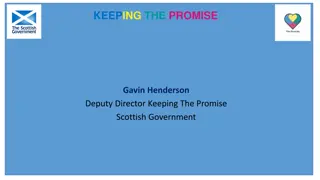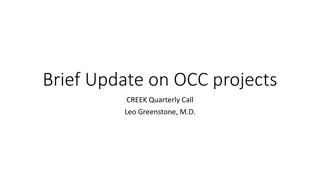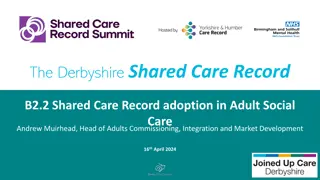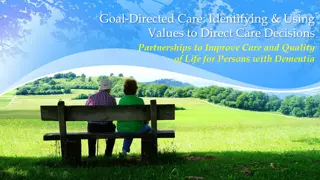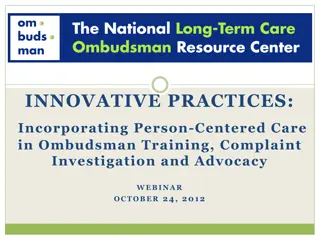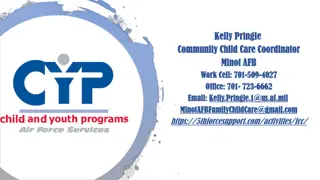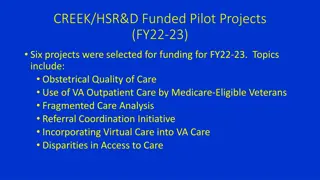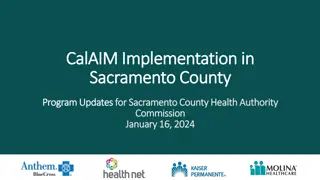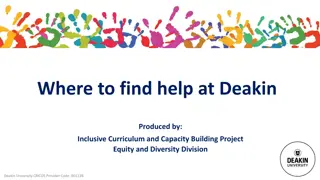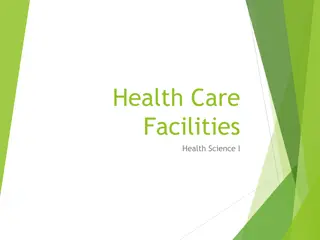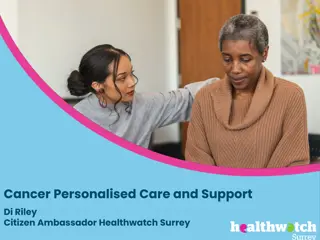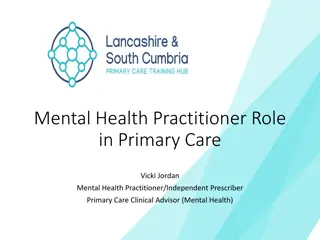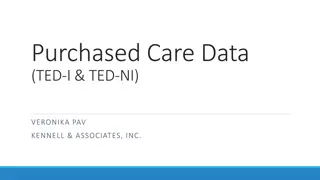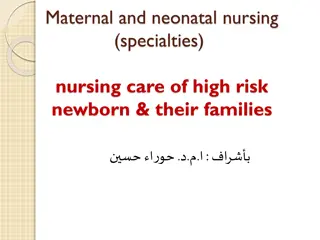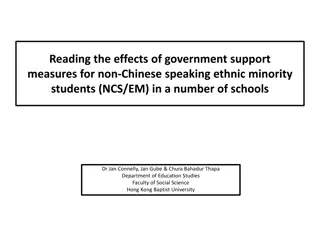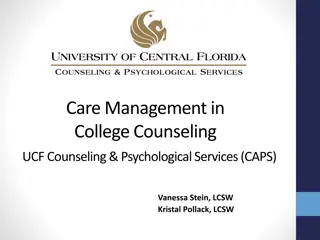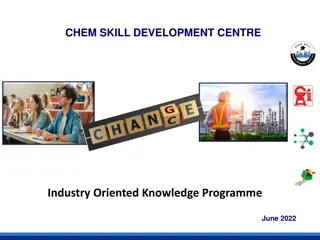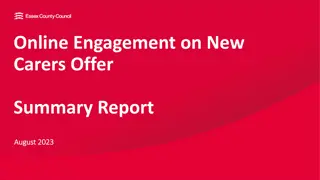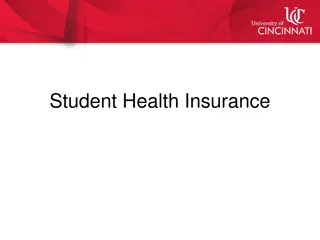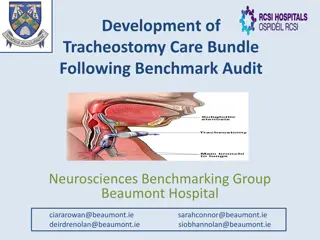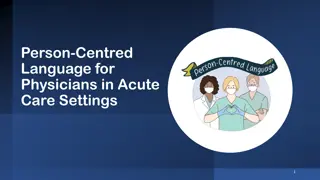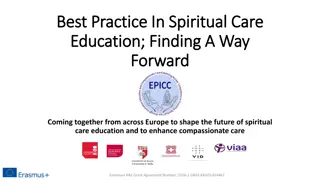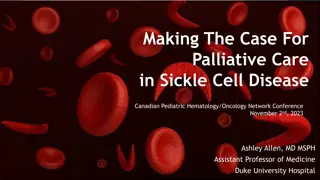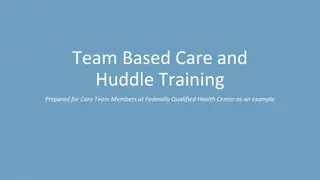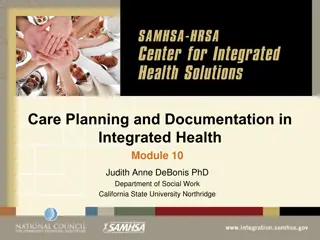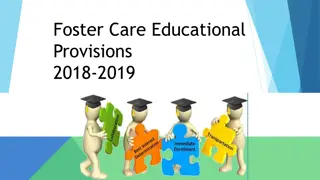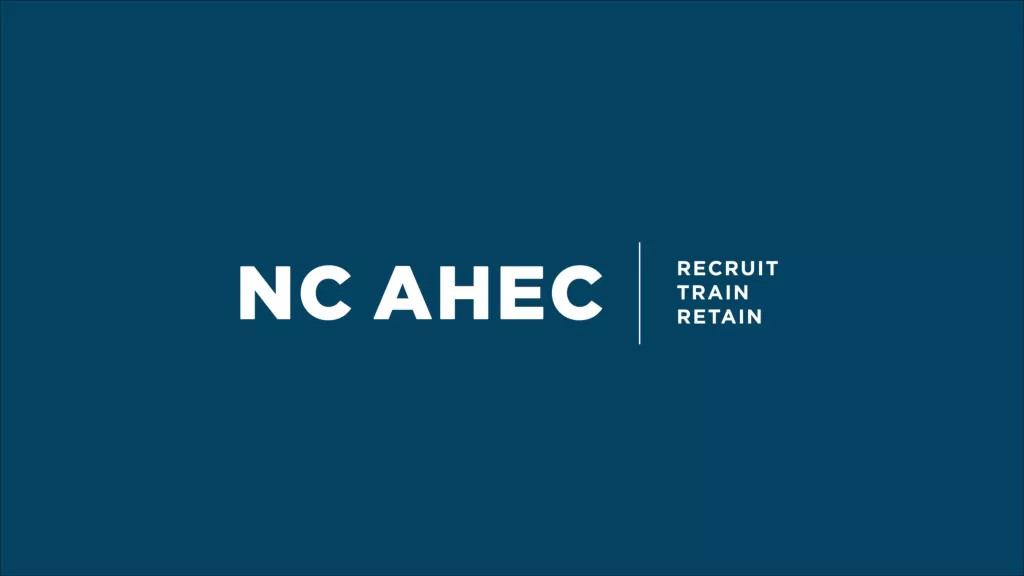Enhancing Support for Care Experienced University Students
Practitioners and experts share insights on improving transitions and success for care experienced university students. Despite challenges, these students demonstrate resilience and achieve commendable outcomes. Data highlights disparities in access, success, attainment, and progression, calling for enhanced support. Designated teachers play a key role in supporting Children Looked After (CLAs) through SMART targets, emotional readiness, performance monitoring, and fostering relationships with stakeholders.
- Supportive Practices
- Care Experienced Students
- Higher Education Transition
- Educational Equity
- Designated Teachers
Download Presentation

Please find below an Image/Link to download the presentation.
The content on the website is provided AS IS for your information and personal use only. It may not be sold, licensed, or shared on other websites without obtaining consent from the author. Download presentation by click this link. If you encounter any issues during the download, it is possible that the publisher has removed the file from their server.
E N D
Presentation Transcript
Keep Up The Good Work: Practitioner Keep Up The Good Work: Practitioner Perspectives on Improving Transitions and Perspectives on Improving Transitions and Success for Care Experienced University Success for Care Experienced University Students Students Alam Begum (Designated Teacher for CLA, Lecturer in Business) Richard Pearce (Director of Higher Education)
I have heard more often than I would like that students [from disadvantaged and minority backgrounds] feel their providers fell over themselves to bring them into higher education, but interest in their needs trailed off the moment they were through the door. John Blake, Director for Fair Access and Participation, OfS, 2022 care leavers who completed their degrees were just as likely to get a first or upper second as similar students. Many achieved highly despite (or maybe even because of) their childhood challenges, overcoming weaker attainment in schools through motivation, determination or resilience. I remain inspired by them. Neil Harrison, 2018
Office for Students Data ACCESS - in 2018-19 only 13 per cent of pupils who were looked after (continuously for 12 months or more) entered higher education compared to 43 per cent of all other pupils. SUCCESS - for 2017-18 entrants the continuation rate of care experienced students was 5.6% lower than for students who had not been in care. ATTAINMENT - for qualifiers in 2018-19 the rate of achieving a first or upper-second class degree qualification was 12.1% lower for care experienced students. PROGRESSION - data also found that care experience may not negatively impact progression into highly skilled employment or further study at a higher level.
The World of the Designated Teacher 1. Help CLAs (Children Looked After) plan SMART targets, and review these. Tend to do better when they are emotionally ready to accept support (Freeman, 2016) Review and monitor performance, attendance and wellbeing with CLAs three times per year absences and exclusions are a key driver of weak performance (Freeman, 2016) Meet CLAs dept managers and course leaders to resolve issues Host drop-in sessions and open forums Take a lead on safeguarding Work with the support of external stakeholders to meet CLAs needs, and create an educational bridge with the local authority (LA) 2. 3. 4. 5. 6. Generally CLAs feel people in the institution determine educational progress, not their carers Generally CLAs feel the 1-1 of the PEP system is enjoyable and beneficial Importance of someone who cared (Freeman, 2016) (Rogers, 2011) and not personal abandonment and staff just doing their job (Rogers, 2011)
The Black Hole of Instant Adulthood Between 18 and University
What do we know has been successfully navigated before University? They have achieved at Key Stage 4 and beyond They raised their own aspirations They have decided they can afford higher education They have accessed the basic financial support they need They have resolved any issues with accommodation
and what might be assumed but lacking? Academic readiness - those with a weaker KS4 (often males) are much more likely to withdraw (Harrison, 2017) Achieving equally despite SEND impacts Positive role models High expectations from others Good quality Information, Advice and Guidance (IAG) Useful personal and emotional support from professionals, including unresolved legal issues (eg immigration) Effective support networks Confidence to self-identify and ask for support
Transition Issues Harrison (2017) identifies the following: Unsupportive foster parents / carers 41% are no longer in touch with carers (Ellis and Johnston, 2019) Help with moving belongings - 28% arrive on their own (Ellis and Johnston, 2019) Personal adviser changes good parent support from LA (Martin and Jackson, 2002) Help with health issues / emotional support / form-filling Link-up with other care leavers / loneliness 41% feel different from their peers (Ellis and Johnston, 2019); taking longer to travel the same distance as peers (Freeman, 2016) More / simpler information a step by step guide Uncertainty about money / poor support from SFE Feeling like the first one ever / bullying / stigma Perceived discrimination about criminal record Bank accounts and background checks
Care-experienced HE student views Only 12% stayed with family (day students), although support was felt to be better for those in university accommodation Many said university did not turn out as expected, but felt the university supported them well. Often not coping well with finances 57% had considered leaving HE generally can be linked to negative transition experiences (most commonly linked to academic issues workload and level) 38% more likely to withdraw than peers Transition issues were also linked to: LA Support (personal adviser), managing change, finance, social/emotional issues, HEI support. Less common were accommodation, and legacy of care experience 35% felt there should be more dedicated support (61% of those who considered leaving). Academic, financial and emotional support especially long term counselling (Harrison, 2017)
What does this mean for universities? Bridging The Black Hole, Instant Adulthood (Rogers, 2011) variation in quality of support from Personal Adviser (Martin and Jackson, 2002), transition in duty of care from LA to HEI, patchy (Harrison, 2017), coaching model (Marchment and Gazeley, 2018), KS4 gaps Decontextualised Na ve Knowledge (Gazeley and Hinton-Smith, 2018)...Getting on the Wrong Course Identifying them The Fresh Start resistance to help, 55% are not comfortable disclosing their background (Ellis and Johnston, 2019), independence vs vulnerability (Rogers, 2011) The Small Sample - problematic identifying impacts of interventions (<30 in each institution) The spirit of the Equality Act, and Office for Students expectations - care by the institution, corporate parent/Alma Mater including long term counselling patchy (Harrison, 2017) The Missing Link Tutor care by the academics, academic adviser/advocate Visualisation/past into future/reflexive space (Gazeley and Hinton-Smith, 2018) Definitions care leaver, care experienced level of access to help (Ellis and Johnston, 2019) eg short care periods, lots of change, can be more damaging than long stable time in care
THE DESIGNATED TEACHER/SUPPORT CHILD LOOKED AFTER (16-18) UNIVERSITY CARE EXPERIENCED STUDENT (18+) CARE LEAVER (18+) KS4 6-12% (v 43%) PEER/UNI SUPPORT THE CORPORATE PARENT 16-18 18+ 18-25+ 20+
THE DESIGNATED TEACHER/SUPPORT THE BLACK HOLE CHILD LOOKED AFTER (16-18) UNIVERSITY CARE EXPERIENCED STUDENT (18+) CARE LEAVER (18+) KS4 6-12% (v 43%) PEER/UNI SUPPORT THE CORPORATE PARENT 16-18 18+ 18-25+ 20+
THE DESIGNATED TEACHER/SUPPORT THE BLACK HOLE NAIVE KNOWLEDGE CHILD LOOKED AFTER (16-18) UNIVERSITY CARE EXPERIENCED STUDENT (18+) CARE LEAVER (18+) KS4 6-12% (v 43%) PEER/UNI SUPPORT THE CORPORATE PARENT 16-18 18+ 18-25+ 20+
THE DESIGNATED TEACHER/SUPPORT THE BLACK HOLE NAIVE KNOWLEDGE CHILD LOOKED AFTER (16-18) UNIVERSITY CARE EXPERIENCED STUDENT (18+) CARE LEAVER (18+) KS4 THE FRESH START 6-12% (v 43%) 2.5K + 3.5K PEER/UNI SUPPORT THE CORPORATE PARENT THE SMALL SAMPLE 16-18 18+ 18-25+ 20+
THE DESIGNATED TEACHER/SUPPORT THE BLACK HOLE NAIVE KNOWLEDGE CHILD LOOKED AFTER (16-18) UNIVERSITY CARE EXPERIENCED STUDENT (18+) THE ALMA MATER CARE LEAVER (18+) KS4 THE FRESH START 6-12% (v 43%) 2.5K + 3.5K PEER/UNI SUPPORT THE CORPORATE PARENT THE SMALL SAMPLE 16-18 18+ 18-25+ 20+
THE MISSING LINK TUTOR THE DESIGNATED TEACHER/SUPPORT THE BLACK HOLE NAIVE KNOWLEDGE CHILD LOOKED AFTER (16-18) UNIVERSITY CARE EXPERIENCED STUDENT (18+) THE ALMA MATER CARE LEAVER (18+) KS4 THE FRESH START 6-12% (v 43%) 2.5K + 3.5K PEER/UNI SUPPORT THE CORPORATE PARENT THE SMALL SAMPLE 16-18 18+ 18-25+ 20+
THE MISSING LINK TUTOR THE DESIGNATED TEACHER/SUPPORT THE BLACK HOLE NAIVE KNOWLEDGE CHILD LOOKED AFTER (16-18) UNIVERSITY CARE EXPERIENCED STUDENT (18+) THE ALMA MATER CARE LEAVER (18+) KS4 THE FRESH START 6-12% (v 43%) 2.5K + 3.5K PEER/UNI SUPPORT THE CORPORATE PARENT THE SMALL SAMPLE THE REFLEXIVE RESILIENT SPACE PAST INTO FUTURE 16-18 18+ 18-25+ 20+
Post-16 Practitioner Perspectives 1. Greater liaison between Post-16, the Local Authority and the University HE taking on appropriate elements of corporate parenting (Harrison, 2017) including transitional activities 2. A sub-group of more vulnerable care experienced students struggle in HE discrimination, unequal access to information, language issues, fears about the ability to cope or the inability to be mobile. (Harrison, 2019) a strategic package for vulnerable care experienced, not just added on to other vulnerable groups provision 3. Longer term counselling for some - trauma 4. Academic link tutor who cares and takes an interest, helps navigate academia, and the interaction between curriculum and support
Opportunities for further work Universities Trialling causes of effects models continuing to explore the likely causes of poor access, success and attainment in care experienced university students from such small samples (TASO) Post-16 The utility of visualisation techniques by key stakeholders throughout the educational lifecycle of the young person How to shape resilience frameworks to better support instant adulthood Local Authorities More effective interventions for bridging the Black Hole and more formally handing over appropriate aspects of corporate parenting to universities
References Ellis, K and Johnston, C (2019), Pathways to University from Care, University of Sheffield. Freeman, J (2015), Educational Outcomes of Children in Care, CSN Policy Briefing. Gazeley, L and Hinton-Smith, T (2018), The success of looked after children in Higher Education in England: near peer coaching, small steps and future thinking , Higher Education Research and Development, 37 (5). pp. 952-965. Harrison, N (2019), Higher education can be a transformative experience for care leavers , WonkHE website, 12/12/19. Harrison, N (2018), Encouraging care leavers into higher education , WonkHE website, 19/01/18. Harrison, N (2017), Moving on up: pathways of care leavers and care-experienced students into and through higher education, NNECL. Marchment, S and Gazeley, L (2018), The Higher Education Champion programme for looked after children: building capacity through collaboration for mutual benefit , National and International Perspectives on Widening Access and Participation, June 2018. Martin, P and Jackson, S (2002), Educational success for children in public care: advice from high achievers , Child and Family Social Work, 7, pp. 121-130. Rogers, R (2011), Instant adulthood and the transition of young people out of state care , Journal of Sociology, 14(4), pp. 411-426.
